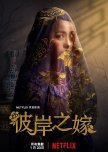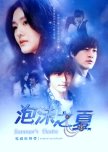
A wholesome and fun YA drama with some refreshing originality
I was intrigued by the premise of The Underclass: a school where everything hinges on academic rankings. I had no idea what BNK48 even was until I'd finished the the series and read the other reviews here so that connection wasn't a factor for me.For me, the appeal was how the drama depicted the joy and struggle of teens figuring themselves out while simultaneously combatting unfair demands and expectations. It did so without being overtly didactic or condescending.
Although there were very recognisable clichés underpinning the entire series, there were also moments of refreshing originality in certain character dynamics and plot points. Most of the characters felt real (with the exception of the more artificial 'bad guys') and, despite the clichés, the school ranking system was actually only a slight exaggeration of my own school experience. I found a lot of my teenage-self in the characters.
That said, at times the ensemble cast felt a little unwieldy – there were perhaps one or two supporting actors too many – but the acting quality itself was of okay quality among the cast. Some of the production quality was patchy every now and then.
Overall, this is a fun Young Adult drama with a good mix of originality and reliable tropes to make it an easy watch.
Was this review helpful to you?

Don't take it too seriously – it's a fun mixed genre Young Adult drama
The Ghost Bride has its faults but what drew me in was the rich world-building. I've never watched anything set in historical Malaysia before nor had I ever encountered the idea of 'ghost brides' before reading the YA novel this series derives from. Those two elements plus the Underworld setting meant that I wasn't too fussed about the characters because the variety of settings became fascinating characters in their own right.I think other reviews have assessed the actual characters well. Special mention goes to Chris Wu just because of his range: I've now seen him perform beautifully in huge different roles in Ghost Bride, Autumn's Concerto, and Shards of Her. Boy, can he act!
I think it is important to remember that this is meant for a younger audience. I was more forgiving than I would normally be about the lack of depth for some of the characters because of the 'Young Adult' genre. There tends to be a certain naîve sheen that comes with that. Normally, I'd be critiquing the class politics too – notice how Amah and Lao Wong are uncritically loyal to the Pan family – but, again, it's a YA audience in mind so I can understand how it could've complicated the story too much.
Overall, this is a fun mystery/fantasy drama with a touch of romance that strays just far enough away from usual YA tropes to stand on its own two legs.
Was this review helpful to you?

Super problematic but still rewatched it like 6 times
I'm pretty sure this was the first non-English language drama I ever watched – I was 12 yo when Summer's Desire came out and a friend at school was watching it. I've rewatched it a handful of times since. But I think just because it was the first ever Taiwanese drama I'd watched, not because it was particularly good. I can't deny this is my most re-watched drama, hence the generous star number there.Look, be warned, this drama has heaps of problematic elements to it. Ok, I'm understating that a lot. I've given this a low rating because this drama has nothing to do with love and everything to do with coercive control. so **big content warning** there. There's no rape scenes thankfully, but it's clear that consent is not a big priority.
Also, as other reviews have noted, this drama is brimming with clichés. Turns out, it was a great drama to begin with because it introduced me to almost all the tropes of Taiwanese and C-Dramas in one go. I also think it took at least three re-watches for me to fully understand the plotline. But, let's be real, you're not watching Summer's Desire for the plot.
The chemistry between the three lead actors is really well done (somewhat despite a sub-par performance from Barbie Hsu who doesn't match her Meteor Garden efforts). The actors do pretty darn well in spite of the cliché characters and dialogue. The support actors also do well to provide emotional depth to the storyline.
The OST is great and makes up for the fact the overall audio quality is a bit patchy (this seemed to be a common thing among Taiwanese dramas of this era, I've now noticed). Just weird audio levels around dialogue and general atmosphere.
Was this review helpful to you?

Took me FIVE YEARS to slog through this drama
In the time it has taken me to scrape and crawl through this drama I have:– Lived through 5 Covid lockdowns
– Changed jobs 4 times
– Moved house 3 times
– Learnt 2 semesters of Mandarin, and
– Breathed the 1 biggest sigh of relief when I reached the credits of the final episode.
Class dynamics, who even is she? I'm a hard agree with Graeme Smith who describes this version of Meteor Garden as "unwatchable". In his article for The Interpreter, he says, "A drama about class divisions set in present-day China – where class divisions aren’t up for discussion – was never going to work."
It's true. Everyone in the series looks like they're acting in a laundry commercial. The sets are sparkly clean, all the actors have amazing teeth, and there is no way Shancai would be able to survive off the occasional shift she does at the bubble tea store.
By removing the class tensions that drove the Taiwanese version (and that was still relatively sanitised – it is a soap opera, after all), the creators gutted the life out of the drama.
It's also just hella boring. I felt no chemistry in any of the romantic relationships. I didn't particularly care about anyone's fate. And I say this as someone who *loves* championing an underdog. But because the class divisions "aren't up for discussion", Shancai isn't really an underdog. And so I found it hard to care much about her so-called struggles.
It got to the point where I was using diversions to keep myself watching. One fun game was tracking the disappearances and re-appearances of Daoming Si's earring/s. It was like playing Spotto with continuity errors.
For the sake of pushing through the last dozen episodes, I put the playback on 1.5x speed (as fast as Netflix would let me), which added an unintended comedic element. It also demonstrated how much screen time went to waste.
However, I'm going to be reeeeeally nice and end on a couple of (backhanded) positives. I did appreciate the music covers and the cameos from the Taiwanese version (but this is nostalgia and should be attributed to the 2001 series). I did also enjoy bits of Darren Chen's performance as Huaze Lei. He made the character seem almost complex, particularly in comparison to the cardboard cutouts that accompanied him on screen.
Was this review helpful to you?

Arthdal Chronicles Part 1: The Children of Prophecy
0 people found this review helpful
Arthdal Chronicles was way more interesting than my political science degree
~Review of Part I only~Honestly, the political drama genre is almost dead to me at this pint. I'm sick of men in suits flouncing around parliament corridors pursued by journalists. I'm also tired of the high fantasy spin on the political drama genre which ends up just being an excuse to objectify women and showcase long-winded battle scenes. So I was thankful when I started watching Arthdal Chronicles for the breath of fresh air.
Part One – the first six episodes of the series – is all about the rich world-building. You're introduced to the characters, their settings, and the key political dynamics that set up the rest of the series.
These six episodes set the key themes for the rest of the series. These revolve around empire/nation building, racialisation, and spiritual agency. The show writers have been careful in their political crafting. They haven't just opted for a simple coloniser versus colonised binary, and instead have woven in layers of nuance right from the opening scene.
The writers also don't seem too keen on didacticism. The colonising act (trying to avoid spoilers here) is certainly depicted as cruel, but at this point the audience already has sympathy for characters on both sides. Ditto in regards to Neanthal, Igutu and Saram dynamics. This way, the characters and plot are able to achieve complexity and depth – the result being a beautifully rich world.
There's also something interesting happening with how the series treats religion/spirituality that means I'm refraining from calling this a fantasy series, but I'll get to that in my review for Part Two.
Was this review helpful to you?




